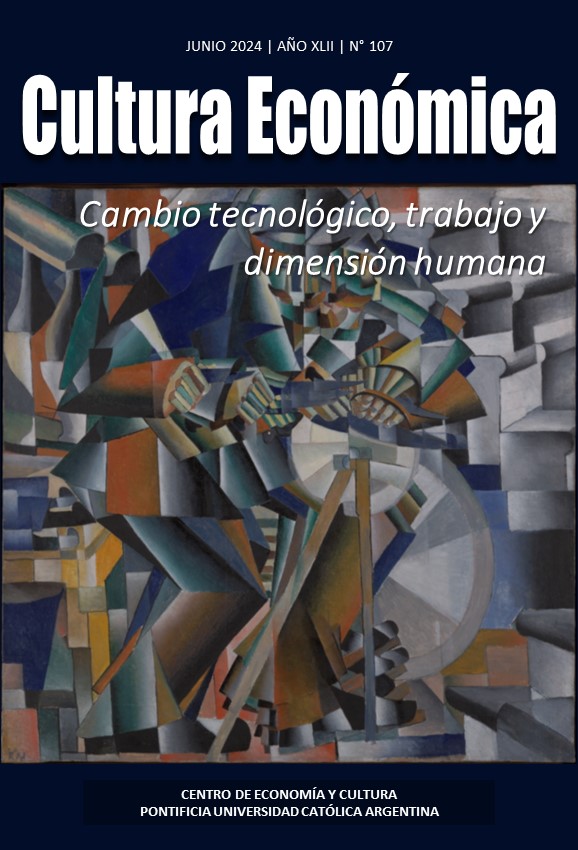Technological change, employment and income distribution: Some considerations
DOI:
https://doi.org/10.46553/cecon.42.107.2024.p7-24Keywords:
technological change, paradigm, employment, income distributionAbstract
From the industrial revolution up to date, technological change has been both a source of concern and optimism, among other reasons, because determining its impact depends on the perspective assumed. This paper addresses two issues: on the one hand, the effects on the level of employment and, on the other, the impact on income distribution.
Downloads
References
Abdelnour, S. (2018). Les nouveaux prolétaires. Textuel.
Aghion, Ph., Akcigit, U., Bergeaud, A., Blundell, R., & Hemous, D. (2016). Innovation and top income inequality. https://scholar.harvard.edu/files/aghion/files/innovation_and_top_income_inequality.pdf
Atkinson, A. (2015). Inequality: What can be done? Harvard University Press.
Atkinson, A., & Stiglitz, J. (1969). A new view of technological change”. The Economic Journal, 79(315), 573-578.
Braverman, H. (1974). Labor and monopoly capital: The degradation of work in the twentieth century. Monthly Review Press.
Decker, R., Haltiwanger, J., Jarmin, R., & Miranda, J. (2014). The role of entrepreneurship in US job creation and economic dynamism. Journal of Economic Perspectives, 28(3), 3-24.
Elster, J. (1992). El cambio tecnológico. Investigación sobre la racionalidad y la transformación social. Gedisa.
Goldin, C., & Katz, L. (2007). The Race between Education and Technology: The Evolution of U.S. Educational Wage Differentials (1890 to 2005) (Working Paper N° 12984). National Bureau of Economic Research.
Guellec, D. (2017). Innovation, emploi et répartition du revenu. In D. Guellec (Ed.), Economie de l’innovation (pp. 77-90). La Découvert.
Guellec, D., & Paunov, C. (2017). Digital innovation and the distribution of income (Working Paper N° 23987). National Bureau of Economic Research.
Huesca Reynoso, L., Castro-Lugo, D., & Rodríguez-Pérez, R. (2010). Cambio tecnológico y sus efectos en el mercado de trabajo: una revisión analítica. Economía, Sociedad y Territorio, 10(34), 749-779.
Keynes, J. M. (2009 [1930]). Las posibilidades económicas de nuestros nietos. En Ensayos de persuasión (pp. 325-338). Síntesis.
Milanovic, B. (10 de diciembre de 2018). The inequality paradox: Rising inequalities nationally, diminishing inequality worldwide. Promarket. https://promarket.org/the-inequality-paradox-rising-inequalities-nationally-diminishing-inequality-worldwide/
Pérez, C. (1996). Cambio técnico, reestructuración competitiva y reforma institucional en los países en desarrollo. CEPAL.
Piketty, Th. (2013). Le Capital au XXI siècle. Seuil.
Ricardo, D. (2003 [1817]). Principios de economía política y tributación. Pirámide.
Rifkin, J. (2010). El fin del trabajo. Nuevas tecnologías contra puestos de trabajo: el nacimiento de una nueva era. Paidós.
Schumpeter, J. (1939). Business cycles. McGraw Hill.
Schumpeter, J. (1963). Teoría del desenvolvimiento económico. Fondo de Cultura Económica.
Tinbergen, J. (1975). Income distribution: Analysis and policies. North-Holland.
Varian, H. (2003). The economics of information technology. Conferencia brindada en la Universidad Luigi Bocconi, Milano, Italia. http://people.ischool.berkeley.edu/~hal/Papers/mattioli/mattioli.pdf
Vico, G. (1995 [1774]). Ciencia nueva. Tecnos.
Downloads
Published
How to Cite
Issue
Section
License
Copyright (c) 2024 Manuel A. Basombrío

This work is licensed under a Creative Commons Attribution-NonCommercial-ShareAlike 4.0 International License.













